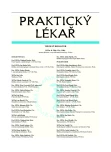-
Medical journals
- Career
Migraine and epilepsy comorbidity
Authors: M. Grunermelová
Authors‘ workplace: Přednosta: doc. MUDr. Otakar Keller, CSc. ; Neurologická klinika Fakultní Thomayerovy nemocnice, Praha
Published in: Prakt. Lék. 2010; 90(3): 157-158
Category: Various Specialization
Overview
Migraine and epilepsy are both chronic episodic disorders, attacks of which are believed to result from brain hyperexcitability. Both disorders are linked by their classification and they share some symptoms. There are many variants of migraine and also of epilepsy, a predisposition for some of them is probably genetically determined. Migraine and epilepsy are highly comorbid. Antiepileptic drugs are increasingly recommended for migraine prevention because placebo controlled, double blind trials have proven them effective. Antiepileptic drugs decrease cortical hyperexcitability by inhibiting glutamate, potentiating GABA, and blocking sodium and calcium channels.
Key words:
comorbidity, migraine, epilepsy, antiepileptic drugs.
Sources
1. Bigal, M.E., Lipton, R.B., Cohen, J., Silberstein, S.D. Epilepsy and Migraine. Epilepsy and Behavior 2003, 4, p. 13-24.
2. Kotas, R. Antiepileptika v profylaxi migrény. Bolest 2005, 8, 1, s. 8-13.
3. Lauritzen, M. Pathophysiology of the migraine aura. The spreading depression theory. Brain 1994, 117, p.199-210.
4. Low, N.C., Merikangas, K.R. The comorbidity of migraine. CNS spectrum 2003, 8, p. 433-444.
5. Marková, J. Komorbidity migrény. Neurologie pro praxi 2005, 6, 5, s. 248-250.
6. Silberstein, S.D., Goatsby, P.J. Migraine: preventive treatment. Cephalgia 2002, 22, p. 491-512.
7. Waberžinek, G. Bolesti hlavy. Praha: Triton 2000.
Labels
General practitioner for children and adolescents General practitioner for adults
Article was published inGeneral Practitioner

2010 Issue 3-
All articles in this issue
-
Evolution and evolutionary theory for physicians.
III. The origin of life - Adverse trends in the development of population health in the Czech Republic
- Viral hepatitis C and metabolic syndrome
- Nosocomial infections
- Migraine and epilepsy comorbidity
- Basal cell carcinoma of the skin – the most important risk and prognostic parameters of disease in clinical practice
- Population immunity against hantavirus infection in two natural habitats
- DNA analysis and histological subtypes of endometrial cancer
- A few remarks on spa therapy of rheumatic diseases
- Mindfulness as prevention and therapy
- Aseptic meningitis as a manifestation of HIV primary infection
-
Evolution and evolutionary theory for physicians.
- General Practitioner
- Journal archive
- Current issue
- Online only
- About the journal
Most read in this issue- Nosocomial infections
- Migraine and epilepsy comorbidity
- Aseptic meningitis as a manifestation of HIV primary infection
- Basal cell carcinoma of the skin – the most important risk and prognostic parameters of disease in clinical practice
Login#ADS_BOTTOM_SCRIPTS#Forgotten passwordEnter the email address that you registered with. We will send you instructions on how to set a new password.
- Career

